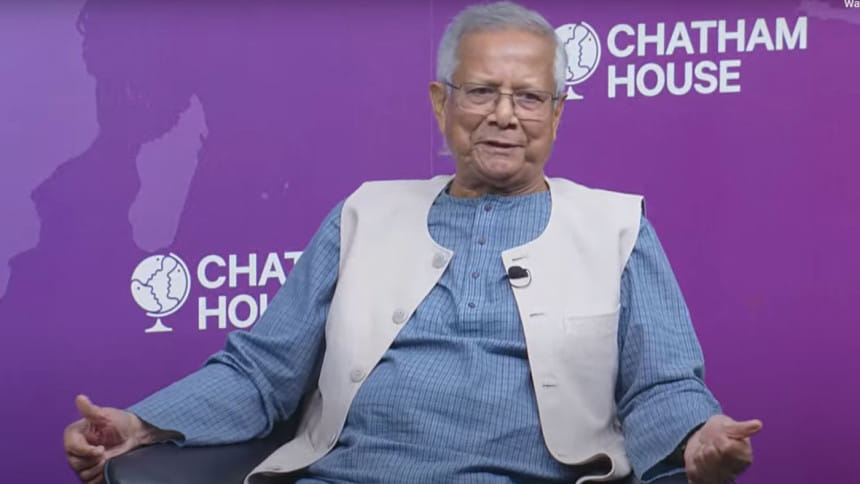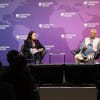People ready, time right for the election

In the interest of the country's safety -- politically and socially -- the nation has decided that, for the time being, the activities of the Awami League will be suspended.
April 2026 is the right time for holding the general election and people are ready for it, Chief Adviser Dr Muhammad Yunus said in a question-answer session at Chatham House in London yesterday.
Replying to a query from Chatham House Director and Chief Executive Bronwen Maddox about the controversy over the election timeline, Prof Yunus said, "Well, I keep saying that we will have the most beautiful election we ever had in our history. The time is right. People are ready."
On a question from the audience as to whether he would be willing to be part of the next government, the CA said, "No way. No way. No way.
"I believe none of our cabinet members would want to do that. That's not our role. Our job is to manage a smooth transition and ensure the people are happy when we hand over power to the elected government. For us, ensuring a credible election is absolutely critical. If the election process is flawed, the whole issue will never be resolved."
Yunus reached London on Tuesday morning on a four-day visit, and is expected to hold a meeting with BNP acting chairman Tarique Rahman tomorrow when they are likely to discuss the next election and other political issues.
Asked whether the interim government was excluding the Awami League and others who disagree with the proposed July Charter, Yunus said, "Yeah, well, there's a debate about that too. Is the Awami League a political party? If they can kill young people in the street, make people disappear, steal money -- would you still call that a political party? That's the debate. This is not a judgment."
He said that after former prime minister Sheikh Hasina fled the country on August 5 last year, people thought that the chapter is closed and that it was the end of such acts by Awami League. "But those who fled -- for them, it didn't end. They continued the same activities in absentia, from abroad, inciting people, causing unrest. So for them, it continues.
"We no longer feel safe out there on the streets…. So in the interest of the country's safety -- politically and socially -- the nation has decided that, for the time being, the activities of the Awami League will be suspended. That's all we've done. We haven't banned the Awami League. We haven't taken any permanent action. We're waiting until the trial is over -- just the trial of those individuals involved [in the atrocities]."
An audience member pointed out that the interim government was silent when the house of Bangladesh's first president, Bangabandhu Sheikh Mujibur Rahman, was demolished, and that the incident divided people and supporters of certain individuals or groups felt excluded. The audience member then asked Prof Yunus how he plans to bring about reform and unity in Bangladesh against this backdrop.
The CA replied, "Many issues hit us all at once. We couldn't handle everything immediately. It took time to bring things under control. One of our biggest tasks was restoring order."
He added that the people didn't trust the police when the interim government was formed. "So we had a deadlock. The police were afraid to do their jobs, and the people didn't accept them. It took time. But thankfully, I can report that things have calmed down now. People are beginning to accept the police again."
Commenting on a question regarding referendums on whether people want reforms, he said the interim government would not opt for a referendum because it could be pointless if the general public did not fully understand the complex issues of reform.
"People might laugh it off or misunderstand what they're voting on. Instead, we are involving all political parties. If they can agree on the reforms, then it's more credible than putting everything into a referendum."
On the moderator's question as to why the interim government didn't trust the voters to vote for any of the parties and pick the best ideas, he said, "I wish we could do that -- if everybody understood what bilateral, bicameral legislation was, what proportional voting was [and] all those complicated things. People say, 'Forget it. How much money will you give me? I'll vote for you.' Voting can turn into that. So we said we don't want to go that path."
He said political unity is the top priority of the interim government because the interim government intended to announce the July Charter next month, a year after the uprising in 2024.
"We've been holding meetings and discussing the creation of a July Charter. It's not easy to get all political parties to sit down and debate, but we are doing it.
"I promise you -- hopefully, I can deliver on this -- that by next month, July, the charter will be announced in the presence of all parties. That is the highest level of unity you can expect in any country, especially just a month or a year after a revolution."
The Consensus Commission led by the chief adviser himself is holding meetings with the political parties on reforms, including of the constitution. The parties still have disagreements over several fundamental issues.
Also, the BNP demands the election by December this year, while Dr Yunus announced early this month that the election would be held in mid-April next year. The National Citizen Party, however, had been seeking more reforms before elections.
During the interview, Prof Yunus also highlighted his government's efforts in economic recovery, particularly reforms in the banking sector, stabilisation of foreign exchange reserves, and the maintenance of macroeconomic stability.
Also yesterday, UK National Security Adviser Jonathan Powell and British Secretary of State for Business and Trade and President of the Board of Trade Jonathan Reynolds held separate meetings with Prof Yunus, according to the CA Press Wing.
Reynolds reaffirmed the UK's support for the interim government's initiatives to recover misappropriated funds siphoned off to various countries. Special Envoy to the CA Lutfey Siddiqi proposed the initiation of a bilateral Free Trade Agreement (FTA) between the UK and Bangladesh, noting that Dhaka has already commenced discussions on FTAs with several countries, including Japan.
During the meeting with UK National Security Adviser Powell, they discussed the Rohingya crisis, democratic transition, recovery of the asset laundered out of Bangladesh, and regional stability in South Asia.
Prof Yunus also visited the House of Lords and observed a debate.
Last night, he attended a dinner hosted by King Charles. Today, Prof Yunus will receive the King Charles Harmony Award from the King.

 For all latest news, follow The Daily Star's Google News channel.
For all latest news, follow The Daily Star's Google News channel. 





Comments